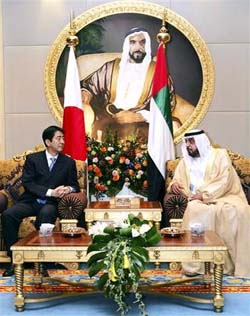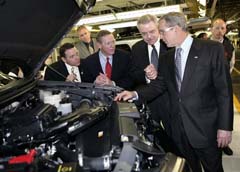Japan's oil future: Locking into a good deal?
Governments around the world that are waking up to the urgency of environmentally responsible policy-making - for now, that doesn't include George W. Bush's global-warming-denying gang - the search for non-polluting, alternative fuels is seriously under way. Still, no one has completely given up on petroleum products. Not yet.
In fact, when Japanese prime minister Shinzo Abe touched down in Abu Dhabi earlier this week during his eight-day Middle East tour, the government-run Japan Bank for International Cooperation (JBIC) announced it "is considering lending several billion dollars in the coming years to help meet the Persian Gulf country's [one of the United Arab Emirates' seven member states] $20-billion demand to boost its crude production and its economy...." (Kyodo in the Japan Times)
 |
Cutting an energy deal that looks good for Japan: Japanese Prime Minister Shinzo Abe (left) and United Arab Emirates President and Ruler of Abu Dhabi Sheikh Khalifa bin Zayed Al Nahayan a few days ago in Abu Dhabi |
As rich as it is, Abu Dhabi will need the foreign investment if it hopes to be able to increase its crude-oil production in the near future from 2.7 to 3.5 million barrels per day. The immediate beneficiary of the deal: Japan, of course, whose industries are almost totally dependent on imported raw materials and which definitely depends on imported oil for many of its energy needs. (Kyodo in the Japan Times) By cutting the Abu Dhabi deal, Japan is ensuring it will have a vital, oil-supply stream in the next few years as energy-hungry China and India, with their booming - and fiercely competitive - economies, keep breathing down its back.
Kyosuke Shinozawa, the head of the JBIC, was one of some 180 Japanese business leaders who accompanied Abe on his Middle East trip. Shinozawa remarked: "It is significant for Japan to secure crude oil on a long-term, stable basis." Japan's Asahi Shimbun, a national daily, reports that the JBIC also expects the proposed loan "will enable other Japanese companies to make inroads into Abu Dhabi, as the [funds to be loaned] will also be spent on construction of refineries and infrastructure, including utilities and transportation systems."
Preoccupied by the Iraq war, Team Bush and lawmakers in Washington apparently have been ignoring the kind of forward-looking deal-making Japan has pursued with Abu Dhabi to ensure a conventional energy supply even as they have mostly ignored formulating and implementing any kind of comprehensive, pollution-controlling, new-energy policies of their own for the United States.
 |
Bush at a Ford Motor Company factory in Missouri in March: Still more talk about a comprehensive, national energy policy than action |
In late March, Bush urged Congress "to pass meaningful energy legislation as soon as possible,...making sure that we promote technologies that, for the sake of our national security and for the sake of good environmental policy...reduce the usage of gasoline....[T]his isn't a pipe dream, this is something that our nation can accomplish." (White House Web site)